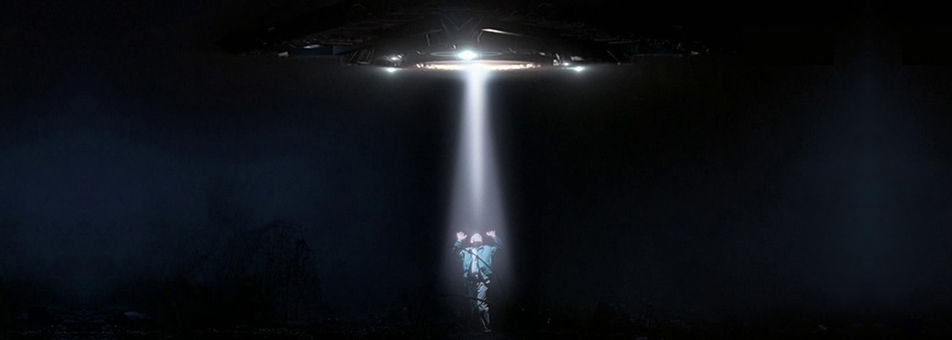The X-Files shared with Carl Sagan a kind of cosmic loneliness — an ache for beings from elsewhere to materialize from the sky, to reveal their secret knowledge, so long obscured from us, of how to snatch meaning back from the void. In one episode, our hero, FBI agent Fox Mulder, watches footage of Sagan stating at a
NASA symposium that "by finding out whether there are civilizations on planets of other stars, we reestablish a meaningful context for ourselves." Mulder and the protagonist of Sagan's novel
Contact both turn the search for little green men into a personal and professional obsession, to the jeering of their colleagues and the derailing of their careers.
But whatever affection for Sagan was built into
The X-Files went unrequited. In 1996, when the show was near the apex of its cultural influence, Sagan griped in his book
The Demon-Haunted World: Science as a Candle in the Dark:
A series called The X Files, which pays lip service to skeptical examination of the paranormal, is skewed heavily towards the reality of alien abductions, strange powers and government complicity in covering up just about everything interesting. Almost never does the paranormal claim turn out to be a hoax or a psychological aberration or a misunderstanding of the natural world.
Sagan goes on to complain about the implausibility of the interspecies breeding depicted in
Star Trek, missing how powerfully it symbolized his own cosmopolitan politics, or willing to ignore it for the sake of pedantry. For the science evangelist, like certain other flavors of moralist, there must be no art in art, only lessons. Even the most passing inaccuracies are direct threats to science, and so to civilization itself. As if in heartsick reply, the
X-Files episode with the Sagan footage aired a few months after his death, with a teary-eyed Mulder watching it to nurse his despair over the revelation that an apparent alien body he'd recovered was an elaborate hoax.
So maybe Sagan didn't quite grasp the fictional part of fiction — but just the same, he might have had a point about
The X-Files. The show depicted the investigations of Fox Mulder (played by David Duchovny) and Dana Scully (Gillian Anderson), two FBI agents who investigate "unexplained phenomena" under the bureau's X-Files unit, whose staff consists solely of Mulder until Scully is assigned in the pilot episode to join him. Created by Chris Carter, a television writer and producer looking for his first big break, it debuted on Fox in 1993, and was an immediate hit, popular enough that a film was made while the show was still on the air — almost unheard of in those days. It was canceled in 2002, and although its reincarnation in a second movie in 2008 went almost unnoticed, it is returning again as a six-episode miniseries in early 2016.
Unlike outright fantasies set in worlds of dragons and unicorns, distant sci-fi futures or galaxies far, far away, episodes of
The X-Files generally take place in suburban or small-town America, familiar settings that give the show's phantasmagoria an ambiguous relationship with reality. And where other horror-sci-fi shows like
Buffy the Vampire Slayer and
The Outer Limits present themselves as parallel realities, with at most an allegorical relation to our own,
The X-Files is premised on exploring the kinds of weird phenomena that some people claim are actually going on in our own world today: UFOs and alien abductions, cloak-and-dagger government conspiracies, mutants, demonic possession, strange creatures living in the sewers, poltergeists, telepathy, past-life experiences, cannibal cults, and satanic ritual abuse. In other words, exactly the kind of tabloid fodder, black-helicopter paranoia, and New Age mysticism that irritated Sagan enough to devote significant time and energy to debunking it.
One of the show's central themes involves powerful forces aligning to frustrate the investigation of The Truth — which, as the tagline from the opening credits reminds us, Is Out There. In many of the show's so-called "monster-of-the-week" episodes, we see town elders suppressing evidence and concealing the dark secrets that haunt their seemingly sleepy burgs. Other episodes explore an ongoing "mytharc" storyline, slowly revealing the existence of a shadowy syndicate of men in black dedicated to suppressing public knowledge of the existence of extraterrestrials.
The other major theme is not about the conspiratorial concealment of the truth but about those who refuse to accept it for themselves, even when they see it with their own eyes. Thus the dynamic between Mulder and Scully, the pitting of Mulder's openness to aliens and goblins against Scully's hard-nosed empiricism. Between believing in science and believing in spooks, the show says, one stands for open-minded intellectual bravery, the other a cowering behind exhausted dogma — just not in the way you've been told.


